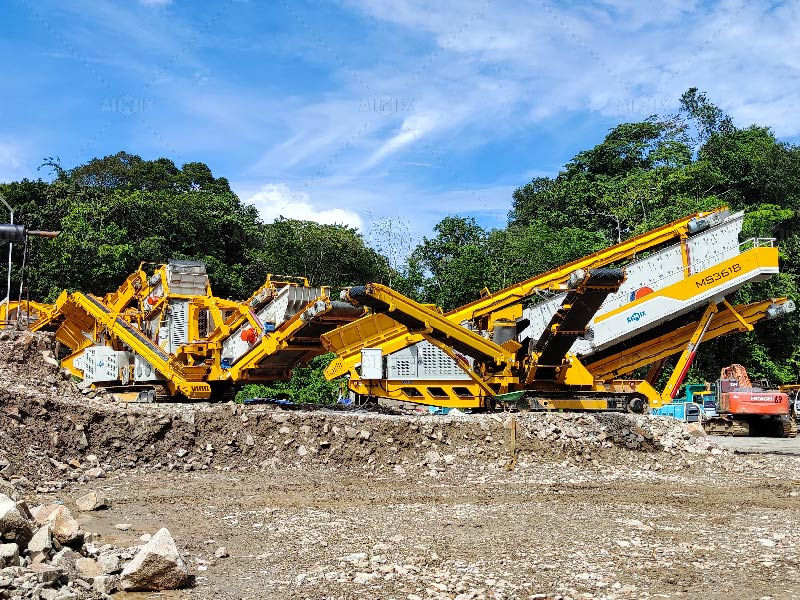Are Mobile Crusher Plants Suitable for Producing Aggregates?
- info515452
- 5月12日
- 讀畢需時 4 分鐘
The mining and aggregate industries are constantly evolving, with new technologies and equipment being introduced to improve efficiency and output. One of the most notable advancements in recent years has been the mobile crusher plant. Mobile crusher plants offer flexibility, mobility, and the potential to reduce operating costs. However, when it comes to producing aggregates, it is important to assess whether these mobile units are truly suitable for the task at hand.
In this blog post, we’ll explore the role of mobile crusher plants(trituradora movil de piedra) in aggregate production and assess their performance compared to traditional stationary systems. We will also discuss how they fit into the larger context of the mining and aggregates sector, which is expected to see continued growth in the coming years.

The Role of Mobile Crusher Plants in Aggregate Production
Mobile stone crushers have gained popularity due to their ability to move from one site to another with ease. They are particularly useful in mining operations where flexibility and adaptability are crucial. A mobile crusher plant can process materials directly at the excavation site, saving both time and transportation costs.
These crushers can be used to process a variety of materials, such as limestone, granite, basalt, and other types of stone. Depending on the design, a mobile stone crusher can perform a range of crushing operations, including primary, secondary, and tertiary crushing stages. The compact design of mobile stone crushers means they can be deployed in smaller, less accessible areas, allowing for better utilization of resources.
Benefits of Mobile Crusher Plants for Aggregate Production
1. Enhanced Mobility and Flexibility
One of the main advantages of mobile crusher plants is their mobility. Traditional stationary equipment requires substantial setup and infrastructure, which can be costly and time-consuming. In contrast, mobile stone crushers can be quickly relocated to different job sites, making them ideal for projects with changing or temporary needs. This mobility also allows mining companies to optimize the layout of their operations and reduce the amount of material that needs to be transported.
2. Reduced Transportation Costs
A key challenge in aggregate production is transportation. Once raw materials are extracted from quarries or mines, they must be transported to processing plants for crushing and screening. This transportation can be a significant portion of the overall cost. Mobile crushers eliminate the need for hauling raw materials over long distances. Instead, materials can be crushed directly on-site, significantly reducing transportation expenses and making the operation more cost-effective.
3. Space Efficiency and Reduced Setup Time
Mobile crusher plants are designed to be compact and easy to set up. This means they can be used in areas where space is limited, or in locations that are difficult to access. Moreover, the setup time is minimal, which helps operators start processing materials quickly. When compared to stationary crushers, which often require complex installation processes and significant infrastructure, mobile plants offer a streamlined and efficient alternative.
4. Versatility in Operations
Mobile stone crushers are not limited to a single crushing function. Many mobile aggregate crushers(chancadora de agregados) are designed to handle multiple stages of crushing, from primary crushing to secondary and tertiary stages. This versatility allows for better material sorting and an efficient workflow, which is crucial when producing high-quality aggregates for construction or other industrial uses.
Limitations of Mobile Crushers for Aggregate Production
Despite the many benefits, there are also certain limitations to using mobile crusher plants in aggregate production. These plants may not always be the best option for high-volume operations that require continuous crushing over long periods. While mobile units are designed to be durable, their productivity may be lower than that of larger, stationary aggregate crushers. Additionally, mobile crushers may have limitations in terms of capacity and the type of material they can process. Larger and more specialized stone crusher plants may be more appropriate for projects that require a high output of a specific type of aggregate.
Key Considerations for Choosing Between Mobile and Stationary Crushers
When deciding between a mobile stone crusher and a stationary stone crusher plant(planta de trituracion de piedra), several factors should be taken into account.
Site location: If your project requires frequent relocation or is located in a remote area, a mobile crusher plant may be more suitable.
Production volume: For high-capacity crushing operations, a stationary aggregate crusher might be more effective.
Material type: Some types of stone, such as very hard rocks, may require specialized equipment that mobile crushers may not be able to handle efficiently.
Conclusion
Mobile crusher plants offer several advantages in the aggregate production industry, including enhanced mobility, reduced transportation costs, and the ability to handle a variety of materials. They are particularly useful in mining operations that require flexibility, cost efficiency, and space optimization. However, for large-scale, high-volume operations, traditional stationary crushers may still be the better option.
Whether mobile crushers are the right choice for your aggregate production needs will depend on the specific requirements of your project. By carefully considering factors like site location, production volume, and material type, you can determine if a mobile stone crusher or a stationary stone crusher plant is the most suitable solution for your business.






留言